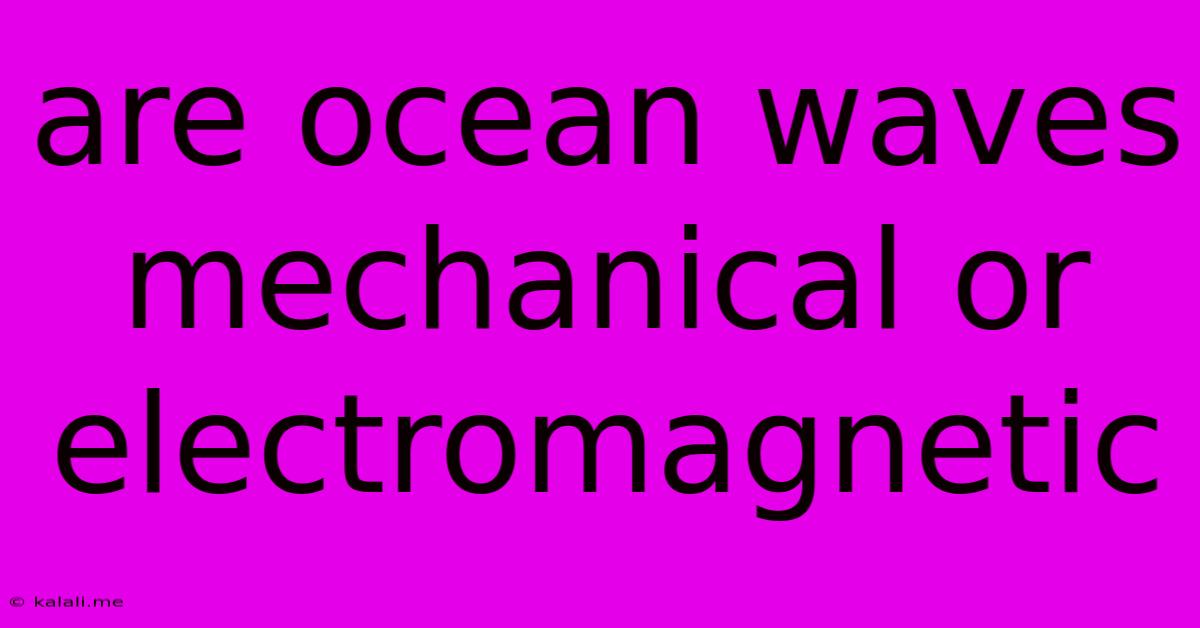Are Ocean Waves Mechanical Or Electromagnetic
Kalali
May 10, 2025 · 3 min read

Table of Contents
Are Ocean Waves Mechanical or Electromagnetic? Understanding Wave Properties
Ocean waves are a captivating natural phenomenon, their rhythmic motion shaping coastlines and influencing global weather patterns. But what kind of waves are they, fundamentally? Are they mechanical waves, like sound, or electromagnetic waves, like light? This article delves into the physics of ocean waves to answer this question definitively. Understanding the nature of these waves is crucial to comprehending their behavior and impact on our planet.
Ocean waves are mechanical waves. This means their propagation relies on the transfer of energy through a medium—in this case, water. Unlike electromagnetic waves, which can travel through a vacuum, mechanical waves require a physical substance to carry their energy. The movement of water particles, transmitting the energy disturbance from one location to another, is the key characteristic that defines ocean waves as mechanical.
Let's explore this distinction further:
Electromagnetic Waves: A Quick Recap
Electromagnetic waves are disturbances that propagate through space by oscillating electric and magnetic fields. These waves don't require a medium; they can travel through a vacuum at the speed of light. Examples include radio waves, microwaves, visible light, X-rays, and gamma rays. They are transverse waves, meaning the oscillations are perpendicular to the direction of energy transfer.
Mechanical Waves: The Nature of Ocean Waves
Ocean waves, on the other hand, are primarily transverse waves, although they also exhibit some longitudinal characteristics, especially in shallow water. The water particles themselves don't travel long distances; instead, they move in a circular or elliptical motion as the wave passes. This up-and-down and back-and-forth movement transfers energy along the water's surface. Factors such as wind speed, fetch (the distance over which the wind blows), and water depth significantly influence the size and characteristics of these waves.
Several types of mechanical waves contribute to the overall ocean wave pattern:
- Wind waves: Generated by wind transferring energy to the water's surface. These are the most common type of ocean waves.
- Swells: These are wind waves that have traveled away from their origin, becoming more organized and longer in wavelength.
- Tsunamis: These devastating waves are caused by underwater disturbances, such as earthquakes or volcanic eruptions. They are characterized by their long wavelengths and immense power.
- Tidal waves: These are not technically waves in the same sense as wind waves but are rather caused by the gravitational pull of the moon and sun on the Earth's oceans.
Key Differences Summarized:
| Feature | Electromagnetic Waves | Mechanical Waves (Ocean Waves) |
|---|---|---|
| Medium | None (can travel in vacuum) | Water |
| Energy Transfer | Oscillating electric and magnetic fields | Particle movement |
| Wave Type | Transverse | Primarily transverse, some longitudinal in shallow water |
| Speed | Speed of light | Varies with water depth and other factors |
In conclusion, the answer is clear: ocean waves are definitively mechanical waves. Their generation, propagation, and characteristics all stem from the transfer of energy through the water medium, a fundamental characteristic distinguishing them from electromagnetic waves. Understanding this distinction provides a crucial foundation for comprehending the complex dynamics of our oceans and their influence on our world.
Latest Posts
Latest Posts
-
How Many 16 9 Oz Bottles Make A Half Gallon
Jun 30, 2025
-
How Many Times Does 3 Go Into 24
Jun 30, 2025
-
What Year Was I Born If Im 15
Jun 30, 2025
-
What Is The Easter Bunny Favorite Color
Jun 30, 2025
-
How Much Is 100 Gallons Of Diesel
Jun 30, 2025
Related Post
Thank you for visiting our website which covers about Are Ocean Waves Mechanical Or Electromagnetic . We hope the information provided has been useful to you. Feel free to contact us if you have any questions or need further assistance. See you next time and don't miss to bookmark.